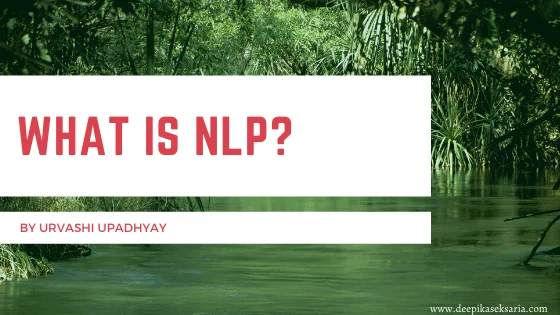WHAT IS NLP (Neuro-linguistic programming)?
👉NLP is an attitude which is an insatiable curiosity about human beings with a methodology that leaves behind it, a trail of techniques – Richard Bandler (one of the co-founders of NLP)
👉It’s a set of tools to deal with the blocks—that we’ve all created—to simply being who we really are – Tony Robbins
👉An owner’s manual for the mind – Chris Howard
The most common way to explain the concept is that NLP refers to Neuro – the human nervous system, including the brain🧠 and the five senses, Linguistic – the verbal and non-verbal languages with which we communicate and Programming – the ability to structure our neurological and linguistic systems to achieve desired results.
NLP officially began in the early 1970s. And no write up on NLP is complete without the mention of the following great minds – the founders and pioneers of developing and promoting NLP – John Grinder, Richard Bandler, Fritz Perls, Virginia Satir, and Milton Erickson – an Internationally acclaimed hypnotherapist.
In essence, NLP is a study of excellence – of what works. Certain psychotherapists were getting fast results with their clients and NLP was primarily about modeling their work. To be able to replicate a technique – somebody else’s already proven learning that was successful, is what fast-tracked results. The tools and techniques you come across in NLP, are merely well-documented strategies that have proven themselves time and again.
NLP isn’t a “thing”.
NLP is the study of what works.
The 3 main areas of NLP are –
✅ Modelling Excellence
Changing Beliefs and Behavior
What we believe will directly affect our behavior. You can change a belief and change your behavior and therefore change the result in life. Whether it is old habits you may want to change or new better ones to form or even let go of unprocessed negative emotions and limiting beliefs,
NLP offers tools and techniques to do all of these easily and effortlessly. NLP techniques help clean up the past emotional baggage and align your present with what you want in the future.
Also, read How to Form New Beliefs and Habits with Affirmations.
✅ Enhanced communication and understanding
This is the most relevant and helpful area for all. Who doesn’t want to communicate better or understand anyone better?
Enhanced communication helps anyone in any walk of life. It is not just for sales or negotiators.. it’s for everyone.. for parents, for couples, for all relationships.
When you can communicate effectively, you are able to get your voice heard and also able to hear other people’s voices and intentions. NLP has taught us ‘Rapport’–that creates trust and opens all lines of communication.
Did you know that 93% of our communication is non-verbal? Only 7% of the communication happens in the words we use.. the rest is our tone of voice and body language!
Philosophy of NLP👇
▶ PROCESS
Fundamental to the philosophy of NLP is the importance of process over content. Most approaches to almost any subject are primarily invested in content even though the process is taken into consideration. NLP at its core is interested primarily in process.
This is where NLP differs from general therapy or counseling. Content is only helpful in that it helps to determine the context in which processes occur.
It is a gentler way of acquiring insight and making a long-lasting permanent change.
NLP is not a ‘to do’ process. It’s a ‘do-with’ process.
▶ FOCUS
nother key aspect of the philosophy of NLP is the belief that what you focus on is what you get. One of the major objectives behind NLP techniques is to get you to focus on something that solves the problem. NLP suggests that the problem exists because of what you were focusing on in the first place.
All our focus are suggestions to our unconscious mind whose primary function is to take instructions from us and deliver results! It is fascinating how the unconscious mind works.
Do you know that more than 95% of our behavior is habitual? And one reason that NLP is so successful is that it has developed techniques that by-pass the conscious mind to work directly with the unconscious mind (subconscious mind), which controls most of our behavior.
Learning NLP is like learning the language of your own mind!
Learning how to become fluent in the language of your mind so that the ever-so-helpful unconscious will finally understand what you actually want out of life. NLP is the study of excellent communication–both with yourself and with others. Let me make this simpler with an example…
Imagine you’re in a foreign country and you had to communicate with someone who didn’t speak your language and so couldn’t understand you. A perfect example would be ordering food in a restaurant expecting to say steak, but when the food showed up, it turned out you actually ordered something else!
This is the kind of relationship that most of us have with our own unconscious mind. We might think we are wishing for more money, a happy, healthy relationship, peace with our family members, and being able to stick to a healthy diet…but unless that’s what is showing up, then something is probably getting lost in translation.
FEW PRINCIPLES OF NLP
✨ NLP is credited to have provided us with many amazing principles that are life-changing. One of them is ‘Cause and effect’ – or the attitude of Empowerment.
How would you like to drop all the reasons and excuses that are somehow seemingly outside of your power and assume full ownership of all the results you have in your life today? As a reward of having that attitude you feel ‘empowered’, you feel that you matter and therefore drop the victimhood attitude and take charge of your life.
✨ Another one is ‘The map is not the territory’ – which means no map regardless of how detailed it will ever be a true representation of the actual terrain.
No amount of explanation of personal experience will ever be experienced in the same way by another person.
We all think differently and experience life differently on the basis of our own conditioning. Think about this in terms of disagreements, fights, and wars. These usually come from a misunderstanding of intention – a failure to recognize all factors and opinions, and from relying on their maps of reality. When two maps don’t align, tension raises.
CONCLUSION
To sum up, NLP is about understanding the way the mind works, so that you can run the correct ‘program’ to bring the results you want. Whether you want to improve your health, your emotional well-being, create long-lasting rewarding relationships, seek high performance or success in life, sport, work or business utilizing NLP effectively can help you achieve it.
Abundance is not something we acquire, it is something we TUNE INTO!
👉 To know more contact Emotional Well-Being Coach Urvashi at https://thetranscendcoaching.com/
Also, Read What is Anxiety and beating it with NLP?, by Zach Hammod.
A quick overview of the topics covered in this article.


























[…] Neuro–linguistic programming (NLP) is frequently referred to as the brain’s user manual. It teaches you how your brain functions and how to intentionally use various NLP techniques to attain your desired outcomes and goals. […]
[…] will see that once you tap into it, you will discover that NLP is beyond what you believe it […]